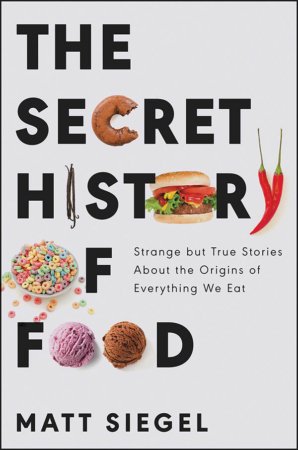Your morning cuppa joe came from Hawaii last month.
Mixed with a little milk from a farm upstate, it’s the perfect pick-me-up. When you add cereal from Iowa, grapefruit from Arizona, and a tiny bit of chocolate from Pennsylvania, you’re set for a while. And when you’re hungry again, grab a napkin and bite into “The Secret History of Food” by Matt Siegel.
Mom and Dad were more influential than you thought they were.
Not only did they each give you half your genes, but they also set up your food preferences. Siegel says that the things you like, and the amounts you consume, were impressed upon you before you even drew your first breath. Your taste for sweet and bitter, your love of garlic, even your ability to drink milk was determined in utero.
It’s often argued that fire was mankind’s best invention, but Siegel argues that it was cooking. The act of cooking food not only saved lives by destroying deadly bacteria, but it expanded our ancestors’ palates, too. Siegel says cooking also saved them energy because cooked food is softer, which cut chewing time considerably. That’s a small thing with big results: it ultimately altered us physically, as a species.
Though the Colonists attempted to bring familiar food to the New World when they arrived, they went hungry a lot, Siegel says. It’s ironic that they had access to what was basically the world’s largest open-air grocery store, but they didn’t heed the Iroquois’ gardening or food-processing tips. The Colonists brought pie to America, though, so there’s that…
The corn that makes up your breakfast (and hundreds of other products you consume throughout the day) literally wouldn’t exist without humans, Siegel says, and vice versa. Potatoes were once thought to be “evil,” bees can make consumable (for you) honey from poison oak flowers, and an adolescent slave boy figured out how to hand-pollinate vanilla plants. And if you’re bored with what’s on the menu, remember this: you have more options at a single fast-food restaurant than your ancient ancestors had their entire lives.
What’s for lunch? Chances are, you’ve already thought about it. You can practically taste it now, but where did it come from? “The Secret History of Food” helps you know.
Through tales that can sometimes be unpalatably urpy, author Matt Siegel takes readers down the garden path to the dinner plate to see why we eat what we eat, even when it’s clearly not good for us, even when our bodies rebel over it.
And yet, there’s nothing preachy here, and nothing meant to make you feel bad about yourself. Siegel, in fact, uses plenty of humor in this highly-researched book, telling facts with snorting asides and footnotes that leave you with a good taste in your mouth. It’s like enjoying a buffet with an adventurous foodie.
So, pick up that fork and consider your meal. It might taste a little different, after you’ve read “The Secret History of Food” because this book’s a recipe for a good read.
“The Secret History of Food: Strange but True Stories About the Origins of Everything We Eat” by Matt Siegel
c.2021, Ecco
$27.99 / higher in Canada
288 pages





Leave a Comment
Your email address will not be published. Required fields are marked with *